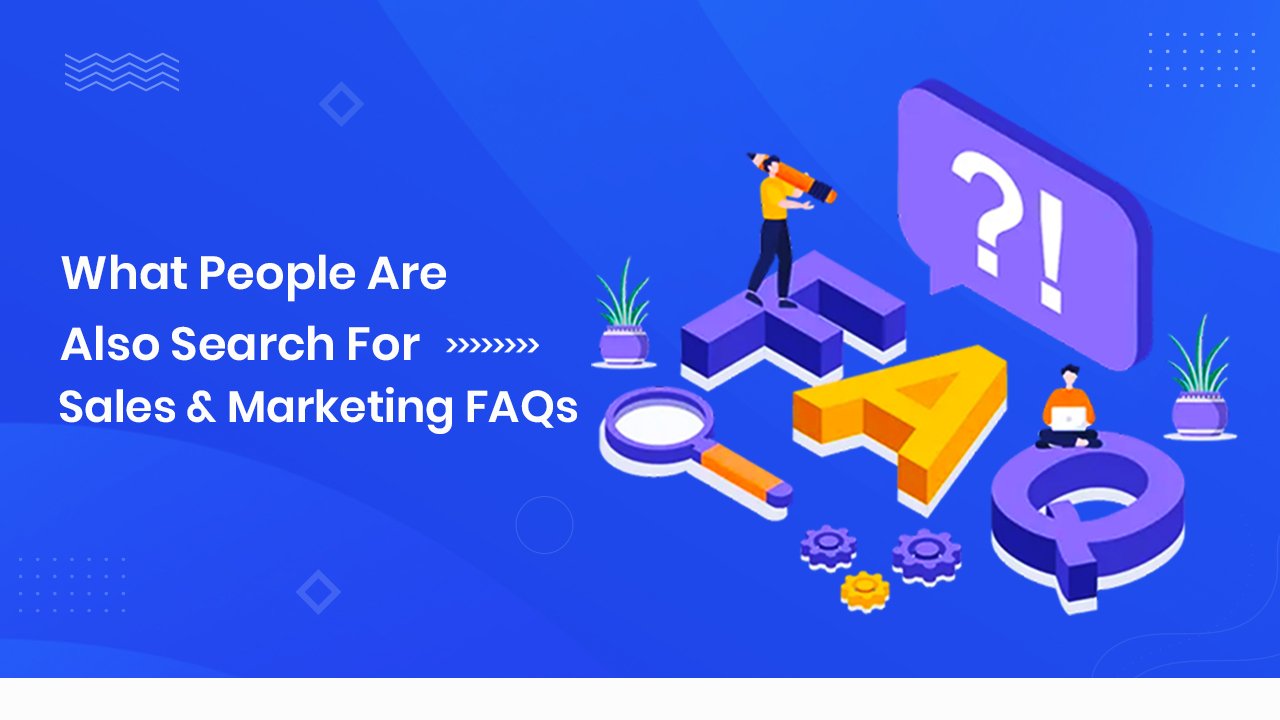Sales and Marketing FAQs, or Frequently Asked Questions, play a crucial role in people also search for sales and marketing. They are crafted to provide quick answers to common questions that the site visitors might have. From the sales and marketing point of view, the FAQs play an important role in addressing concerns, building trust, and guiding the customers through the sales journey.
FAQs are designed by anticipating common queries that the customer might have, such as product benefits, pricing, usage or installation, comparisons, lifeline, etc. FAQs serve several purposes:
- Streamline customer communications: Prospects can find answers to their doubts without having to go through the process of contacting customer support, thus saving time and improving sales.
- Reduces the burden on customer support team: As FAQs give the clear answers to common questions people also search for, it reduces the load on customer support and also improves conversions.
- Builds trust: FAQs as answers to what people also search and they boost the trust rating of the brand because the customer feels that the brand cares, and this builds credibility.
- Improves website SEO: By using the right keywords, FAQs improve the website’s visibility on search engines, drawing in more traffic and boosting conversions.
- Position the brand as an expert: Well-crafted FAQs reflect the business as authoritative in their field and committing to putting the customer first always.
Role of People also Search for in designing Sales and Marketing FAQs.
‘People also Search For’ is Google’s way of making its users to get all information in one search. It analyses a vast amount of data, including past searches, location, device used, real-time updation, and user behavior, to strategically suggest ‘People Also Search For’ to help people get more out of the search engine query.
Here we have listed some benefits of using ‘People Also Search For’ inspired FAQs in your sales and marketing campaigns.
- You know what your competitor keywords: The People also Search For summary is an insight into the secondary keywords that have the highest potential to be searched after the primary keyword. These keywords are curial for understanding what the customer might also look for and highly relevant in generating new and impactful FAQs so that the consumers find all the answers on your page and do not feel the need to research further.
- You get better SEO (Search Engine Optimization): When your FAQs align with the primary, secondary, and long-tailed keywords from the PASF snipped, it will greatly increase the visibility of your content to the targeted audience and improve the ranking of your website on the search engine.
- Improves brand awareness: PASF inspired FAQs bring more eyeballs towards your website, which the sales and marketing team can use to turn the target audience into potential customers and improve conversions.
- Helps refine the sales and marketing campaigns: The PASF insights and keywords are the key to boosting your strategies and making the most of the marketing funnel.
- It does not cost anything: ‘People also Search For’ tool is absolutely free. Google is giving you the keywords and topics on a silver platter and does not ask for anything in return. All you need to do is to make careful observations and incorporate them into your sales and marketing strategies.
Developing a sales and marketing FAQ is a way to get the maximum potential from the business strategy. FAQs drive intelligent traffic towards your site, and it improves the awareness of the product, and creates conversions and loyalty. PASF can create magic in the FAQs. The ‘People also Search For’ returns have a high search volume and relevance, and it makes them the ideal choice for FAQs.
Creating FAQs based on “People Also Search For” is an excellent way to enhance the sales and marketing strategies and build your authority in your field. Here is a guide to crafting FAQs using PASF with a focus on sales and marketing topics as an example.

Step 1: Understanding the “People Also Search For ” sales and Marketing Insights
The FAQ page should address the most common questions that the customers have about the product, services, and as a brand. It also speaks about how much your brand values customer care. Use of PASF results can offer insights of what to include (concerns or interests).
For example, when the primary topic is Sales and Marketing Strategies, some PASF might include
- What are 7 sales and marketing strategies?
- How to generate sales leads?
- What are the trending marketing strategies of 2024?
Step 2: Research on relevant PASF
Look up the relevant questions on different platforms. For example, Google search’s for primary and secondary keywords, Using the automation platforms such as SEMrush to know more about the related queries. Another way to analyze the competitor websites for similar topics and their FAQs.
For example, for the Sales and Marketing Strategies, common PASF can be
- How are sales and marketing strategies different?
- What are the best tools for digital marketing?
- What are the latest trends in Sales and Marketing?
Step 3: Structure your FAQs
Once you have your keywords, the next step is to develop detailed and informative answers that are related to your business or niche. Structure your FAQs in a way that the keyword inclusions appear natural and not forced. The answers are what that will position you as an authority in your niche. Group similar topics under one question to form a logical structure. Put the most important information at the top.
For example, the ‘People also Search For’ for the query ‘Social media marketing’ gives results as
- What are the 7 Ps of digital marketing?
- How do I create a digital marketing plan?
- What are the 5 stages of planning a digital marketing strategy?
Step 4: Continuously Update FAQs
As your business grows, the customer intent will also change, and they will ask more questions or queries about the existing and new products. Hence, you should regularly revisit PASFs to incorporate the new questions. Add the new questions that are trending, add about evolving trends, and if possible, incorporate the customer feedback and troubleshooting tips in the page FAQs.
Make sure that the FAQ tab is clearly visible and well laid out. Over complicating things will only turn off the customer. By leveraging the “People Also Search For” you can craft FAQs that will build customer’s trust in your brand, resonate with their intent, improve the SEO rankings, and give you a chance to get to know your audience at a better level. To make your FAQs stand out, focus on clarity, relevance, simple language, and actionable advice, and it will be a simple path to success.
Read Also: How ‘People Also Search For’ Can Shape Your Sales and Marketing Strategy






